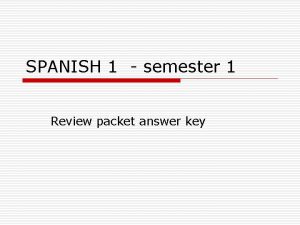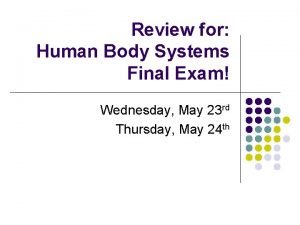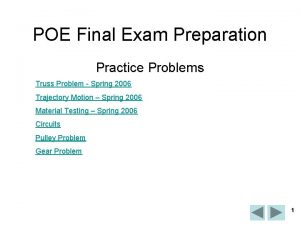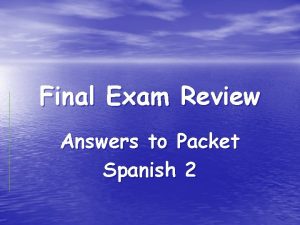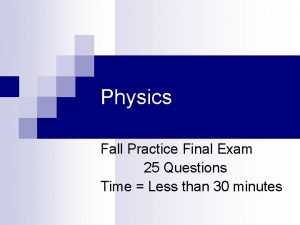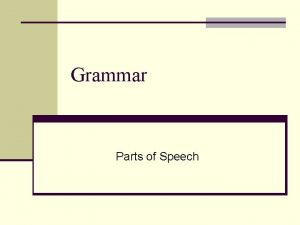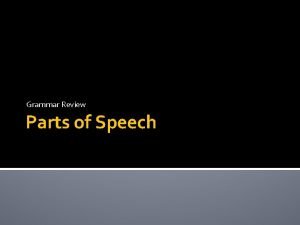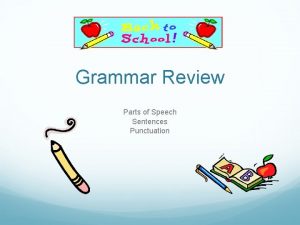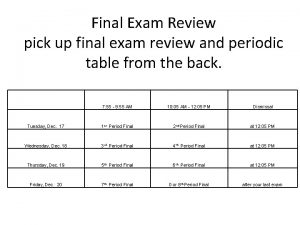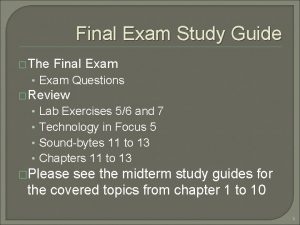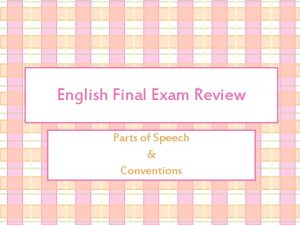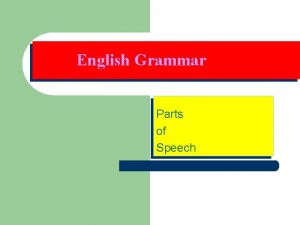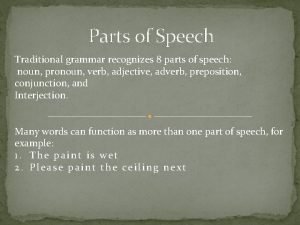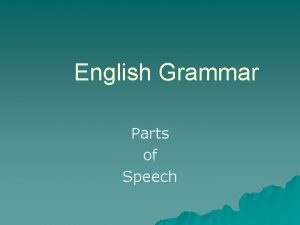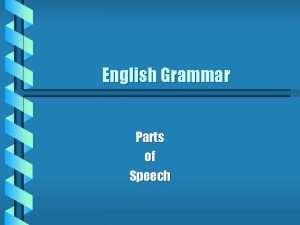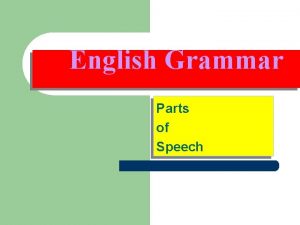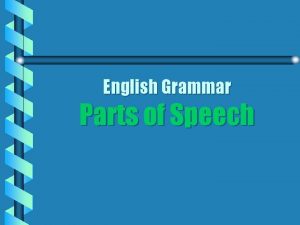Grammar Rules Final Exam Review Parts of Speech















- Slides: 15

Grammar Rules Final Exam Review

Parts of Speech n Preposition – u u u n Typically shows location in place or time Tells where something takes place ('at' the store) When or why something takes place ('before' dinner) general descriptive information (the girl 'with' the cool shoes) Other preposition words: “of” and “for” A prepositional phrase always ends with a noun or pronoun (he went to the store). https: //www. youtube. com/watch? v=l 3 d. ZJd. D 71 XM

Parts of Speech n Pronoun – n A word that takes the place of a noun, noun phrase, or noun clause. u Can function as a subject, or complement in a sentence. u Examples: anything, each, ourselves, that, these, whatever, nothing, most… https: //www. youtube. com/watch? v=ko. ZFca 8 Ak. T 0 u

Parts of Speech continued n n Interjection – u Most commonly used in informal language rather than in formal writing or speech. u Function is to express emotions or sudden bursts of feelings. u Is in the form of a single word, a phrase, or even a short clause. u If it needs a lot of emphasis, add an exclamation mark after. If not, as in a form paper, just use commas. u Examples: Sweet! I got a PS 4 for my birthday! Holy cow! I forgot my keys! Shawie is our chemistry teacher. Oh, the horror! u Examples formal essays: Well, some may claim that Iago was not truly an evil character… Othello does, in fact, treat Desdemona horribly throughout most of the play. https: //www. youtube. com/watch? v=Yk. AX 7 Vk 3 JEw

Parts of Speech continued n Conjunction – u the part of speech used as a “joiner” for words, phrases, or clauses in a particular sentence. Examples: u Used to identify compound sentences u “I was trying to daydream, but my mind kept wandering. ” u I know I will do well on my final; however, I still need to review my grammar. u https: //www. youtube. com/watch? v=RPo. BE-E 8 VOc

Appositive Phrase n n n a noun or noun phrase that renames another noun right beside it Is separated from the main sentence with commas. Purpose is to give the reader more detail about the noun it modifies. Usually begins with a, and, or the Can be taken out of the sentence. u u Example: The insect, a large cockroach with hairy legs, is crawling across the kitchen table. Example: Queen Victoria, one of England's greatest monarchs, ruled for over sixty-three years.

Participle Phrases n n n n Used as an adjective Begins with a word that looks like a verb Begins with a participle word (ending in “ing” “ed” and rarely “en”). Usually located directly after or directly before the noun it modifies. Can be taken out of the sentence. u Example: Is that Arthur running for the bus? u Example: You could see the panther releasing its grip. Punctuation: When a participial phrase begins a sentence, a comma should be placed after the phrase. u Arriving at the store, I found that it was closed. If the participle or participial phrase comes in the middle of a sentence, it should be set off with commas only if the information is not essential to the meaning of the sentence. u Sid, watching an old movie, drifted in and out of sleep. Note that if the participial phrase is essential to the meaning of the sentence, no commas should be used: u The student earning the highest grade point average will receive a special award.

Punctuation is Powerful! An English professor wrote the words… “A woman without her man is nothing. ” All of the males in the class wrote: “A woman, without her man, is nothing. ” All of the females wrote: “A woman: without her, man is nothing. ” n

Gerund Phrase n n n Begins with an ing word CANNOT take it out of the sentence Functions as the subject or the direct object No commas are used Can be replaced with the word “this” or “these” u u Example: Eating ice cream on a windy day can be a messy experience if you have long, untamed hair. Example: Bill decided that scrambling over the pile of debris was not safe. (the gerund phrase serves as the direct object in this sentence).

Infinitive Phrase n “to” plus a verb u u Example: He likes to knead the dough slowly when making pizza. Example: The teacher stayed after school to help her students.

Simple Sentence n n n Does not have a clause Can have an unlimited amount of phrases Only contains one complete sentence (independent clause) u u u Example: The coaches and administration were pleased to announce the results of the game Example: I love to read simple sentences upon getting up and before going to bed. Example: Eating cotton candy on a windy day can be a very sticky experience!

Compound Sentence n Two complete sentences separated by a semicolon or a conjunction. u u u Example: The real Oz, the man behind the curtain, was neither great nor powerful; the story portrays an ineffective president as a bumbling wizard. I am going to do well on the final, and I love grammar! I got this; however, I still plan to study for the final.

Compound-Complex Sentences n n Two complete sentences with one or more clauses. Clause is adjective or adverb u u Example: Although I like to go camping, I haven't had the time to go lately, and I haven't found anyone to go with me yet. Example: We decided that the movie was too violent, but our children, who like to watch scary movies, thought that we were wrong.

Complex Sentence with an Adjective Clause n n n Begins with a who, whom, whose, that, or which Must have a verb in it Functions as an adjective, answering the questions: What kind? How many? or Which one? Must be able to draw an arrow to the word it describes. You can always take the clause out of the sentence and still have a perfectly-written sentence left. u u u Example: Diane felt manipulated by her beagle Santana, whose big, brown eyes pleaded for another cookie. Example: Growling ferociously, the two dogs competed for the hardboiled egg that bounced across the kitchen floor. (Note: when using an adjective clause, only place commas around the clause if it is NOT essential to the meaning of the sentence)

Elements of a Complex Sentence with an Adverb Clause n n Typically begins with: Since When If Although Because Even though Contains both a subject and verb and may contain phrases Cannot express a complete thought on its own Answers one of these four questions: How? When? Where? or Why? Example: Tommy scrubbed the bathroom tile until his arms ached. How did Tommy scrub? Until his arms ached, an adverb clause. u u Example: After her appointment at the orthodontist, Danielle cooked eggs for dinner because she could easily chew an omelet. t Note: when a sentence begins with an adverb clause, you MUST put a comma after the clause. t When a sentence contains an adverb clause later in the sentence, you do not use a comma.
 Ap gov review final exam review
Ap gov review final exam review World history spring final exam review answers
World history spring final exam review answers Spanish final exam review packet answer key
Spanish final exam review packet answer key Pltw human body systems final exam review
Pltw human body systems final exam review Poe practice test - materials answer key
Poe practice test - materials answer key Ied final exam
Ied final exam World history semester 2 exam review
World history semester 2 exam review Entrepreneurship 1 final exam review
Entrepreneurship 1 final exam review Spanish 2 review packet
Spanish 2 review packet End of semester test environmental science b edmentum
End of semester test environmental science b edmentum World history final exam review
World history final exam review U.s. history semester 2 final exam
U.s. history semester 2 final exam English 2 semester exam
English 2 semester exam Physics 20 final exam practice
Physics 20 final exam practice Physical science jeopardy
Physical science jeopardy Mat1033 final exam
Mat1033 final exam


